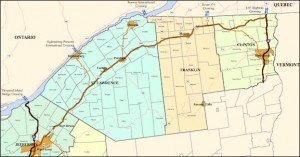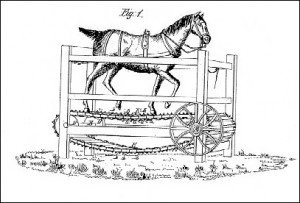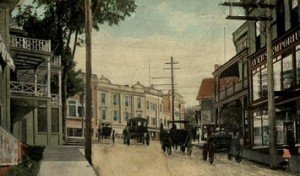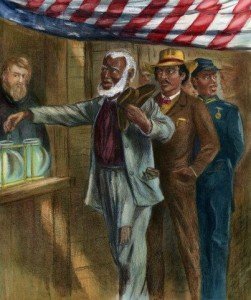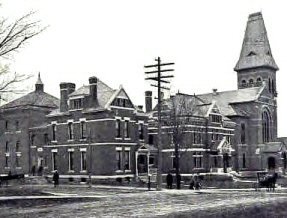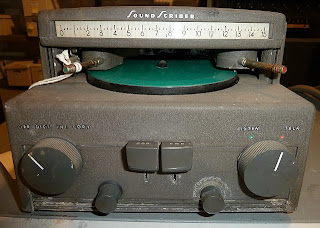
Access to hundreds of audio recordings that reveal the rich histories of Clinton, Essex, and Franklin Counties are now available at SUNY Plattsburgh’s Feinberg Library’s Special Collections.
Recordings include Adirondack Folk Music- Clinton, Essex, and Franklin County oral histories, including those by local residents born prior to the American Civil War- SUNY Plattsburgh concerts- a 1963 recording of Edward “Doc” Redcay on piano and Junior Barber on dobro- and four-time Pulitzer Prize winner Robert Frost reading his works.
The collection of recordings is the result of a collaborative effort by SUNY Plattsburgh Communications Professor Timothy Clukey and Feinberg Library’s Special Collections staff. According to a statement released to the press “copyright restrictions require that researchers visit Special Collections during open hours to listen to any of these recordings.” The recordings are available as mp3 files on a new Audio Station computer kiosk.
A Soundscriber Recorder was used in the mid-20th century by Marjorie Lansing Porter, historian for Clinton and Essex counties. Porter recorded 456 interviews with elderly local residents telling stories and singing traditional Adirondack folk music.
Among the folk music examples, Granma Delorme sang more than one hundred folk songs for Porter, including a Battle of Plattsburgh ballad composed by General Alexander Macomb’s wife. Included also is “Yankee” John Galusha singing “The Three Hunters,” “A Lumbering We Shall Go,” and “Adirondack Eagle.” Francis Delong sings “My Adirondack Home,” and “Peddler Jack.”
Many of the recorded songs deal with mining, lumbering, Adirondack folk tales, and other subjects, as well as traditional Irish and French folk music handed down through generations. The Porter Oral History Interviews cover many topics of historical interest in Clinton and Essex Counties, such as ferry boats, Redford glass, mining, and lumbering.
The Audio Station also includes 96 interviews conducted by William Langlois and Robert McGowan with elder Franklin County residents in the 1970s.Plans in the works for additions to the Audio Station include:
Rockwell Kent audio recordings (now on reel-to-reel tapes in Special Collections’ Rockwell Kent Collection)-
SUNY Plattsburgh Past President Dr. George Angell speaking on antiwar action in 1967—“Protest is Not Enough”-The 1965 SUNY Plattsburgh Students for a Democratic Society and S.E.A.N.Y.S. teach-in, “The Vietnam Question,” with introduction by Dr. Angell- A1964 speech by Senator-Elect Robert Kennedy on the Plattsburgh campus- and a 1964 meeting between Senator-Elect Kennedy and Dr. Angell, discussing various local and county concerns and other topics.For more information, contact Debra Kimok, Special Collections Librarian (email: [email protected] telephone: 518-564-5206).
During the summer, the Feinberg Special Collections will be open on Mondays and Tuesdays, from 1 pm – 4 pm, and on Wednesdays, Thursdays, and Fridays, from 10 am – noon and 1 pm – 4 pm. Saturday appointments can be arranged with the Special Collections Librarian.
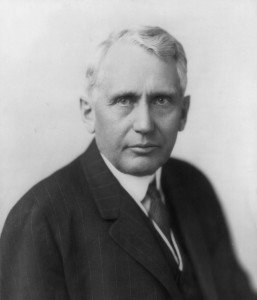 The Potsdam area of St. Lawrence County is home to many citizens of great accomplishment. The achievement list is extensive: a US Secretary of State- a Nobel Peace Prize winner- a judge on the World Court- an attorney known as the “Trust Buster” for defeating multiple gigantic corporations, including Rockefeller’s Standard Oil Company- and a man who was the force behind the historic Kellogg–Briand Peace Pact of 1928.
The Potsdam area of St. Lawrence County is home to many citizens of great accomplishment. The achievement list is extensive: a US Secretary of State- a Nobel Peace Prize winner- a judge on the World Court- an attorney known as the “Trust Buster” for defeating multiple gigantic corporations, including Rockefeller’s Standard Oil Company- and a man who was the force behind the historic Kellogg–Briand Peace Pact of 1928.